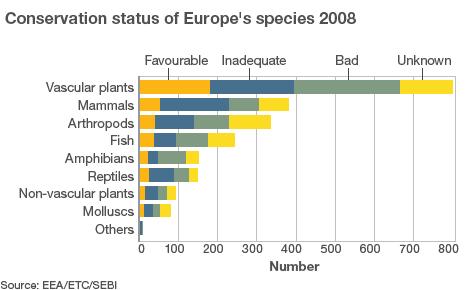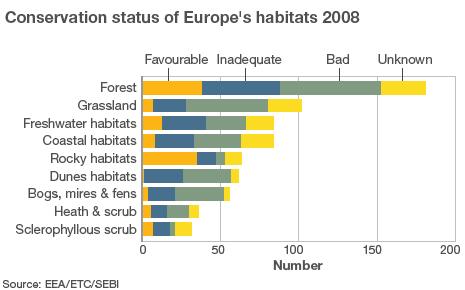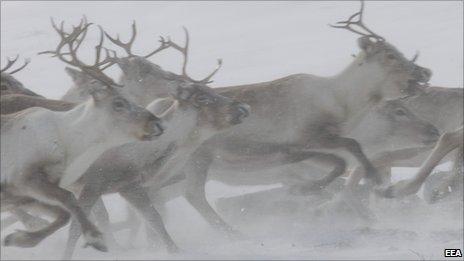Growing demand for resources 'threatens EU economy'
- Published

Agriculture is a key part of the EU's economy, with about half of Europe's land being farmed
The growing global demand for natural resources risks undermining Europe's economy, a report has warned.
The outlook, produced by the European Environment Agency, said the increases were driven by a need to satisfy changes in global consumption patterns.
The agency said there were no "quick fixes" but called on businesses, individuals and policymakers to work together to become more efficient.
It added that Europe had made progress on emissions, but more had to be done.
"We are consuming more natural resources than is ecologically stable," said EEA executive director Jacqueline McGlade ahead of the formal launch of the fourth Environment State and Outlook Report (SOER 2010), external.
"This is true for both Europe and the rest of the planet," she added. "Climate change is the most visible sign of instability so far, but a range of global trends suggest greater systematic risk to ecosystems in the future."
The report's authors said that EU environmental policy had "delivered substantial improvements", but added: "However, major environmental challenges remain, which will have significant consequences for Europe if left unaddressed."
For example, Europe's network of protected areas and habitats had been expanded to cover about 18% of the continent's landmass, yet the EU had failed to meet its target to halt biodiversity loss by 2010.
But Europe is not alone. At a recent UN biodiversity meeting, it was acknowledged that the global target of halting biodiversity loss had been missed.
Delegates at the Convention on Biological Diversity (CBD), external gathering in Japan agreed to establish a 10-year plan aimed at preserving nature, but conservation scientists said the goals for protecting areas of land and sea were too weak, as was the overall target for slowing biodiversity loss.

Biodiversity effectively means the diversity of life and consists of four main components: genes, species, habitats and ecosystems.
Conservationists use criteria that categorise the health of species' populations and the health of habitats. For example, "favourable" indicates organisms or areas that are expected to prosper without changes to existing management policies.
However, at the other end of the scale, "unfavourable - bad" refers to species or habitats that are in serious danger of becoming (locally) extinct.
Recent assessments, such as The Economics of Ecosystems and Biodiversity (TEEB), external, have highlighted the importance of biodiversity to the long-term well-being of humans and the global economy.

An estimated 1,700 vertebrate species, 90,000 insects and 30,000 vascular plants have been recorded in Europe.
The EU's Habitats Directive, external, which - along with the Birds Directive, external - forms the backbone of the continent's conservation policy, lists more than 1,000 species and 200 habitats deemed to be of European importance.
The authors of the EEA benchmark report said Europe's biodiversity was heavily influenced by human activities, including agriculture, forestry and fisheries, as well as urbanisation.
They added that roughly half of Europe's land area was farmed, while natural areas were increasingly fragmented by urban areas and infrastructure development.
'Huge implications'
In a globalised world, the report warned that there were a number of key factors beyond European policymakers' direct control.

The majority of Europe's forest habitats are deemed to be in an unfavourable condition
It said the world's population was set to pass nine billion by 2050, resulting in a greater number of people aspiring to better quality of life.
This could have "huge implications" for the global demand for resources, it added. For example, cities were continuing to expand, consumption was rising and people expected economic growth to continue.
"The race into the unknown offers opportunities, but will also bring new risks," it warned.
The EEA study observed that moving to a resource-efficient green economy would require all environmental resources - including biodiversity, rivers and seas, atmosphere - to be fully considered in production, consumption and trade decisions.
The authors observed that prospects for the 27-nation bloc's environment were mixed, but there were opportunities to make it more resilient to future risks and changes.

Reindeer in the Arctic have struggled to get access to food in some years as a result of changes in the climate
The 10 key messages within the 222-page report included:
Continuing depletion of Europe's natural capital and ecosystem services will "ultimately undermine Europe's economy and erode social cohesion"
EU on target to reach Kyoto Protocol commitments, but greenhouse gas cuts are "far from sufficient to keep average global temperatures below 2C (3.6F)" above pre-industrial levels
Despite establishing an extensive network of protected areas, the EU has so far failed to meet its goal of halting biodiversity loss
Increased resource efficiency and security can be achieved, thus reducing the EU's dependence on natural resources elsewhere and encourage innovative measures being adopted
Professor McGlade concluded that there were no quick fixes.
"Regulators, businesses and citizens need to work together and find innovative ways to use resources more efficiently," she said.
"The seeds for future action exist; the task ahead is to help them take root and flourish."
- Published29 October 2010
- Published26 October 2010
- Published7 October 2010